Health Informatics
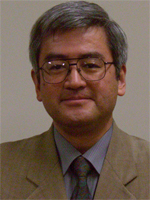
Masayuki KAKEHASHI, PhD, DSc
The mission of our laboratory is to find out and establish useful information on health-related factors in health promotion. To achieve this mission, health-related socio-economic data and outcome data are collected and analyzed using mathematical models and statistical methods. The actual research topics include: the analyses and prediction of infectious disease spread, relationship between the incidence of coronary heart disease and weather conditions, the evaluation of cancer mass screening, questionnaire survey study on health promotion, and the study of medical expense and related factors.
Fundamentals of Nursing
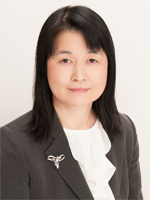
Sanae ORIYAMA, RN, PhD
The principle and fundamental nursing study offers basic knowledge and skills for professional clinical nursing practices-specifically, history, theory, concepts, service and care delivery systems, administration, education of nursing, and, understanding human beings as an object of nursing, based upon the actuality of assessing outcomes of nursing care. Therefore, the area of research and education covers a wide range in health sciences and nursing, such as: the influence of common nursing care and skills upon the human body and health behaviors, by using techniques from physiology, biochemistry, and human engineering, from various angles, the development of more effective nursing-intervention methods for all people, and the improvement of educational methods for students.
Midwifery and Maternal-Newborn Nursing
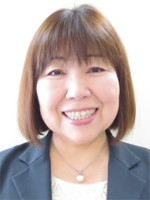
Mitsuko OHIRA, RN, RNM, MSN, PhD
Our team is making developments, and is achieving good results in the fields of clinical research and nursing practice. For this purpose, we cooperate and collaborate with many medical institutions, such as University Hospital, Prefectural Hospitals, and home-visiting nursing stations. Our main study subjects include the following: Pain management for high risk neonates, Neonatal palliative end of life care, Spiritual care for NICU patients and staffs, Breast feeding for high risk neonates, Resilience of mothers of high risk neonates, Japanese culture of childbearing and childrearing in infants, Development of Midwifery continuing education programs.
Chronic Care & Family Nursing
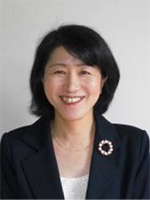
Michiko MORIYAMA, RN, MSN, PhD
Research and Education: In order to improve patients’ outcomes, QOL, and self-care level, we collaborate and conduct research studies with hospitals, companies and communities in Japan, and the world, in areas of Adult Nursing (Medical/Surgical Nursing from Acute to End-of-Life), Chronic Illness Disease Management, Oncology nursing and Medical Service Delivery System, based on Outcome Management /Outcome Research methods. We also conduct research and nursing practice studies in the areas of Family Nursing, and Psycho-oncology.
Pediatric Nursing
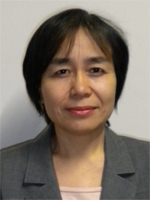
Ikuko SOBUE, RN, PhD
We are concerned with the health promotion of children and their families, and are carrying investigations forward, in the fields of chronic illnesses and disabilities, child maltreatment, developmental disorders, and pediatric oncology. The main topic of research are pediatric emergency care system and health problems among single mother’s family.
Mental Health and Psychiatric Nursing
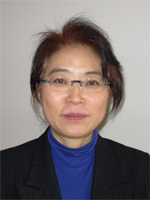
Hiroko KOKUSHO, RN, PHN, MSN
Our major research area is promotion and maintenance of mental health and nursing support to people suffering from mental health problems. More specifically, our research focuses on support to mentally-handicapped people in the community, their QOL and care, perception of the mentally handicapped and protection of human rights.
Health Care for Adults
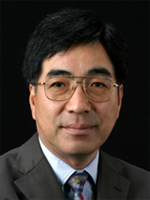
Tsuyoshi KATAOKA, MD, PhD
Our laboratory is involved in basic, and clinical studies, mainly using patients in the perioperative period, and cancer patients, as subjects. Prevention of infection, trauma care, and palliative medicine are also important issues for our research. Graduate students are encouraged to acquire the latest information, and to carry out original and individual research. We are also carrying out studies in collaboration with other laboratories and researchers in our university, and with clinicians.
Home Health Care and Public Health Nursing
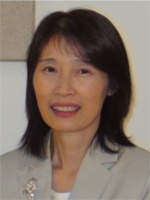
Hisae NAKATANI, RN, PHN, PhD
In society with aging and declining birthrate, community health is becoming increasingly important. The role of home care and community nurses is to improve health status and QOL. They are working at government nurse, visit nurse, occupational nurse and school nurse in Japan. Cooperation of the various professions needs for health promotion in community health nursing. Our main themes of research are prevention of lifestyle disease, family support, home care management and evaluation of Long-Term Care Insurance.
School and Public Health Nursing
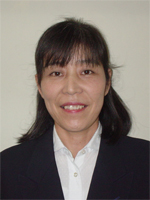
Hiromi KAWASAKI, RN, PHN, MPH, PhD
Our research area is on health education including support to healthy life at school, kindergarten and nursery, and maintenance and promotion of health of the family, as well as liasion between different fields of profession involved with growth and development of children. We also investigate activities of school nurses at affiliated schools and others. Issues on health education involved with community nursing and assessment of related projects are also pursued from a nursing perspective.
Gerontological and Oncology Nursing
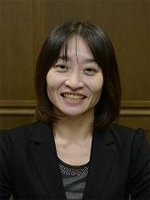
Mika MIYASHITA, RN, PHN, PhD
Our research interests focus on cancer survivorship, quality of life in elderly people and their family, and HIV/AIDS nursing care. Current researches concern the information needs in young breast cancer survivors, and assessment and management of symptoms related to cancer and cancer therapy, especially chemotherapy induced cognitive changes. We are also interested in the experiences of patients with HIV/AIDS. We aim at the development of nursing care for patients with HIV/AIDS, and education program to nurses.
Sports Rehabilitation
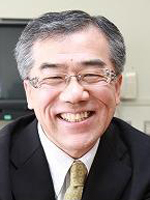
Yukio URABE, PT, AT, MA, PhD
Our research focuses on sport injury prevention, rehabilitation methods, and creating new equipment for sport rehabilitation. For example, ACL injury prevention and rehabilitation method after reconstruction, ankle injury, low back pain prevention, as well as shoulder injury treatment. We will propose a new strategy for the concept of sport rehabilitation.
Biomechanics
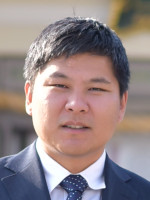
Makoto TAKAHASHI, RPT, PhD
We analyze kinetic and kinematic components and properties of everyday activities performed by healthy people, and also by people with disabilities. Some activities studied include gait (walking and running) and sit-to-stand movement, which are the most common of human movements. We use instruments such as 2D and 3D video systems, force platforms, accelerometers, and others, to collect and analyze the motions.
The findings of our research, which is based on biomechanical data analysis, are applied to improve the quality of life of people who have restricted freedom of motion, as well as for rehabilitation, by developing new therapeutic exercises. We are also involved in developing proactive strategies for health promotion, and preventing physical injuries and disabilities stemming from repetitive motion.
Physical Analysis and Therapeutic Sciences
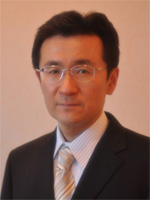
Hironobu HAMADA, MD, PhD
Recent medical progress and enhancement in the health care system has extended the average life expectancy, resulting in an unprecedented aging society in Japan. As an aging population is generally accompanied by internal diseases such as respiratory disease and heart disease, the rehabilitation that targets these diseases has become more important. From the viewpoint of cardiorespiratory response, immunological function, and oxidative stress during exercise, we conduct educational and research activities on exercise for health promotion among the elderly as well as rehabilitation in patients with internal diseases.
Bio-Environmental Adaptation Sciences
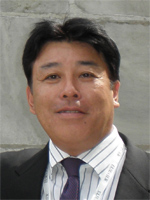
Louis YUGE, RPT, PhD
Our research focuses on:
- Nerve, cartilage, bone, muscle, and regeneration medicine methodology, especially stem cell (ES cells, iPS cells. and mesenchymal stem cell) culture in microgravity and physical stimuli,
- Bio-reaction (cells and tissues) to physical stimuli, such as microgravity, electrical stimulation, ultrasound, etc.,
- Space flight adaptation syndrome, especially bone and muscle molecular biology,
- Analyze the central nerve system and human movement using MEG (Magnetoencephalography), NIRS (Near-infrared Spectroscopy), and Tractography,
- Development of Neuro-rehabilitation using the movable suit type robot. The mission of our laboratory is to create and establish useful techniques related to new findings in people with disabilities. To achieve this mission, human-biology-related morphological, molecular, and physiological data are collected and analyzed using newly developed methods.
Neurorehabilitation and Emotional Science
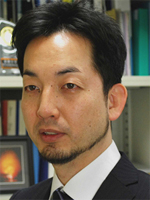
Susumu URAKAWA, RPT, PhD
Our research themes are:
- how the robotic devices interact with patient as a rehabilitation therapy,
- brain activity during the rehabilitative motor-task,
- how the physiotherapy (e.g., manual therapy or thermotherapy) improve the musculoskeletal functions including the muscular pain,
- the effects of enriched environment on brain plasticity, and
- development of the rehabilitation therapy for skeletal muscle mitochondrial dysfunction with heart failure and diabetes.
Integrative Physiology

Kanji MATSUKAWA, PhD
This laboratory has been conducting basic physiological research using humans and animals to study “the logic of life”. The subjects of the current projects is summarized as follows:
- to understand neural mechanisms responsible for integration and coordination of the autonomic, cardiovascular, and motor systems during exercise,
- to understand central regulation by higher brain centers of the autonomic nerve system, and
- to understand underlying mechanisms for application of mental motor imagery to rehabilitation medicine.
Human Behavior Science of Occupational Therapy
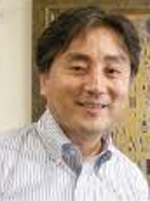
Hideki MIYAGUCHI, OTR, PhD
To do better occupational therapy based on theory and practice, we research how human behavior is related to physical impairment, cognitive impairment, social psychological factors, and the environment. Our research themes are analysis of theory of occupational behavior, mechanisms of human behavior and development of assessment forms and intervention methodology.
Sensorimotor Neuroscience
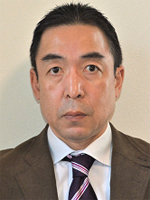
Hikari KIRIMOTO, OTR, PhD
In 2017, a new Prof. Kirimoto has taken post. In recent works, he demonstrated that transcranial static magnetic field stimulation (tSMS) could modulate cortical somatosensory processing in humans (Kirimoto et al, Brain stimulation, 2014; scientific Reports, 2016). We are preparing for clinical application of tSMS for facilitate the treatment of various neurological disorders.
Psychosocial Rehabilitation
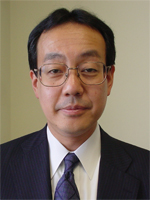
Hitoshi OKAMURA, MD, PhD
We aim to establish psychosocial rehabilitation methods for maintaining or improving quality of life (QOL) of subjects. To achieve the objective, we are planning and conducting the following studies:
- Study on cancer rehabilitation,
- Study on rehabilitation for elderly people with or without dementia,
- Study on rehabilitation for patients with mental disability.
Analysis and Control of Upper Extremity Function
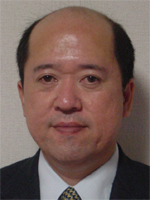
Toru SUNAGAWA, MD, PhD
The main theme of our laboratory is to analyze the relationship between the function of the brain and that of the hand. The hand function is absolutely important for the human as being the human, and we believe that the treatment or stimulation of the brain has a great role for the treatment of the hand disorders. The ongoing studies in our laboratory are the brain-mapping during the sensory or motor stimulation of the hand, the three-dimensional analysis of hand and wrist motion, and so on. One of our goals is the treatment of brain dysfunction by hand therapy, and that of hand dysfunction by direct brain stimulation.
Gerontological and Community-Based Occupational Therapy
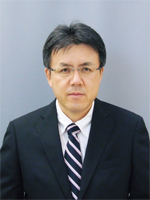
Hideaki HANAOKA, OTR, PhD
The concept of our laboratory is to develop and establish effective occupational therapy interventions to support “meaningful and valuable” daily life (QOL and Wellbeing) of healthy, frail, disabled and demented elderly subjects.
Our research topics are demonstrated as follows;
- Study of reminiscence activities to elderly subjects
- Study of health promotion program to middle-aged and elderly subjects
- Study of preventive care for community-dwelling elderly subjects
- Study of activities and health for community-dwelling elderly subjects
- Study of QOL and wellbeing of elderly subjects with disabilities and dementia
 Masayuki KAKEHASHI, PhD, DSc
Masayuki KAKEHASHI, PhD, DSc Sanae ORIYAMA, RN, PhD
Sanae ORIYAMA, RN, PhD Mitsuko OHIRA, RN, RNM, MSN, PhD
Mitsuko OHIRA, RN, RNM, MSN, PhD Michiko MORIYAMA, RN, MSN, PhD
Michiko MORIYAMA, RN, MSN, PhD Ikuko SOBUE, RN, PhD
Ikuko SOBUE, RN, PhD Hiroko KOKUSHO, RN, PHN, MSN
Hiroko KOKUSHO, RN, PHN, MSN Tsuyoshi KATAOKA, MD, PhD
Tsuyoshi KATAOKA, MD, PhD Hisae NAKATANI, RN, PHN, PhD
Hisae NAKATANI, RN, PHN, PhD Hiromi KAWASAKI, RN, PHN, MPH, PhD
Hiromi KAWASAKI, RN, PHN, MPH, PhD Mika MIYASHITA, RN, PHN, PhD
Mika MIYASHITA, RN, PHN, PhD Yukio URABE, PT, AT, MA, PhD
Yukio URABE, PT, AT, MA, PhD Hironobu HAMADA, MD, PhD
Hironobu HAMADA, MD, PhD Louis YUGE, RPT, PhD
Louis YUGE, RPT, PhD Susumu URAKAWA, RPT, PhD
Susumu URAKAWA, RPT, PhD Kanji MATSUKAWA, PhD
Kanji MATSUKAWA, PhD Hideki MIYAGUCHI, OTR, PhD
Hideki MIYAGUCHI, OTR, PhD Hikari KIRIMOTO, OTR, PhD
Hikari KIRIMOTO, OTR, PhD Hitoshi OKAMURA, MD, PhD
Hitoshi OKAMURA, MD, PhD Toru SUNAGAWA, MD, PhD
Toru SUNAGAWA, MD, PhD Hideaki HANAOKA, OTR, PhD
Hideaki HANAOKA, OTR, PhD
